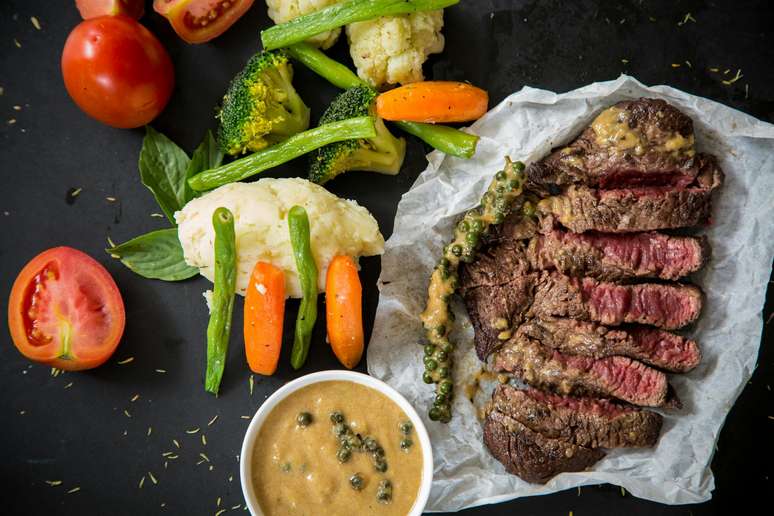Favorites in the fitness universe, these nutrients are the best allies for those looking to increase lean mass. Understand why
Anyone in the fitness world already knows that protein can be one of your best friends. But if you are just getting into this field, or have been in it for a while, but still don’t know exactly what role protein foods play in the body, stay with us and today we will tell you all about this essential macromolecule for weight gain.
To explain it in a simplified way…
Lúcia Endriukaite, nutritionist at the Instituto Ovos Brasil, explains that proteins are nutrients made up of fundamental amino acids and that perform numerous functions in the body. Among these, the promotion of muscle mass. “During resistance training, microtears occur in the muscle fibers that need to be repaired. And this is where proteins come into play, as they provide essential amino acids, such as leucine, necessary for protein synthesis which ultimately promotes resistance. ‘increase in muscle mass.’
“Leucine acts as a key signal, as it activates the mTOR pathway, which is essential for protein synthesis. Therefore, it promotes the repair of muscle fibers, which results in an increase in muscle mass.”
Protein-rich foods
Protein can be found in both animal and plant foods. In the first option the main foods are eggs, chicken, fish, red meat, pork and dairy products. But several plant foods are also good sources of protein, such as legumes (beans, chickpeas, lentils, peas, soy), tofu, oats, quinoa, chia and seeds.
Among all these possibilities, Lúcia highlights that eggs, in particular, stand out for their high protein quality and digestibility, as well as providing:
- B complex vitamins and fat-soluble vitamins A, D, E, K;
- Minerals such as iron, selenium, magnesium, mono and polyunsaturated fatty acids;
- Carotenoids with antioxidant properties.
In addition to being a tasty, practical and easily accessible food, the nutritionist draws attention to a recent study carried out on eggs. “The researchers found that consuming whole eggs, which contain leucine and other essential nutrients, resulted in greater stimulation of muscle protein synthesis than consuming egg whites alone,” he comments.
Post workout protein
Well, now that it is clear that proteins are essential for the recovery and regeneration of muscle fibers, a question may arise: when is the right time to consume protein foods after physical activity? Tatiane Schallitz, nutritionist at the Instituto Nutrindo Idealis, answers. “An attractive range for post-workout protein consumption is within 120 minutes, a period when the body is most receptive to nutrients for recovery.”
The professional also adds that “at this time, combining proteins and carbohydrates can further aid recovery, as carbohydrates help replenish glycogen stores and facilitate the transport of amino acids to the muscle.”
Quantity requested
Tatiane recommends consuming between 1.2 and 2 grams of protein per kilogram of body weight per day for those looking to gain muscle mass. “We adjust this amount based on factors such as age, gender, weight and physical activity level. Typically indicating higher values for those who do intensive training,” he adds.
The ideal, according to the expert, is to divide the protein intake throughout the day, avoiding concentrating it only in the main meals. “This fractionation helps maintain constant protein synthesis, which is essential for increasing muscle mass. Especially for those who perhaps consume less protein than necessary,” he points out.
Whey protein: to take or not?
Finally, Tatiane clarifies that protein supplementation, through products such as Whey Protein, can be a practical and advantageous tool for those who have a high protein requirement or encounter difficulties in reaching the ideal amount of protein with food alone. It is a valid strategy, which will depend on factors related to individual needs, lifestyle, type of diet, practice of physical exercise and also practicality for the routine. But it is not an absolute necessity. “In many cases a balanced diet is sufficient to satisfy these needs; however, in specific situations – such as intensive training or diets with high protein consumption – the supplement helps to achieve the recommended values in a practical and convenient way,” he concludes. ..
Source: Terra
Ben Stock is a lifestyle journalist and author at Gossipify. He writes about topics such as health, wellness, travel, food and home decor. He provides practical advice and inspiration to improve well-being, keeps readers up to date with latest lifestyle news and trends, known for his engaging writing style, in-depth analysis and unique perspectives.








